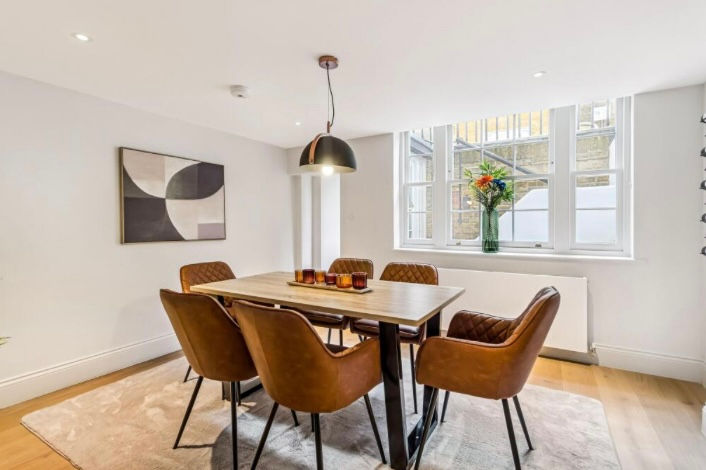The Psychology of Home Staging
- naomichance
- Mar 5, 2025
- 4 min read
Updated: Jul 16, 2025
Why It Works and How to Use It in 2025
Time is money in property sales! And I'm not just saying that – the numbers prove it. According to Rightmove's latest market analysis, the average UK property sits on the market for 45-65 days depending on your region.[1]
But here's the game-changer: professionally staged homes sell 73% faster.[2] This remarkable difference isn't just about making properties look prettier – it's about understanding the psychology of home staging and how it influences buyer behavior and decision-making.
That's potentially saving you MONTHS of mortgage payments, stress, and uncertainty. The psychology of home staging works by creating emotional connections that turn casual viewers into serious buyers, dramatically reducing your time on market.
Let's get your property sold – quickly, profitably, and with minimal headache.

Preparing for Staging Success: Strategic Planning
The Pre-Staging Advantage
The Home Staging Association UK reports that 85% of staged homes sell for 5-23% above asking price.[3] Your preparation checklist:
Property assessment: Identify strengths and weaknesses
Create a staging budget: Typically 1-3% of asking price
Develop room-by-room strategy
Schedule staging 2-3 weeks before market listing
Quick win: A professional staging consultation costs £150-£300 but can increase your sale price by thousands.
Kerb Appeal: First Impressions That Sell
The 7-Second Rule
University of Oxford research reveals that buyers form first impressions within 7 seconds of seeing a property.[4] Make those seconds count!
Exterior staging musts:
Fresh front door paint (£30-£50)
Clean windows (£80-£120 professional clean)
Manicured lawn and garden beds
Clear pathways and entrance
Potted plants for instant impact (£20-£40)

Living Room Staging Strategies
The Heart of Your Home
Zoopla's buyer surveys show that 86% of buyers consider the living room the most important space.[5]
Transformation techniques:
Furniture arrangement: Create conversation areas
Lighting: Layer with table lamps, floor lamps, and ambient light
Accessories: Style in odd numbers (the design rule of three)
Textiles: Add softness with cushions and throws
Art: Hang at eye level (approximately 150cm from floor)
Kitchen Staging for Maximum Appeal
The Deal-Maker Space
According to the Royal Institution of Chartered Surveyors, kitchens can increase property value by up to 6%.[6]
Kitchen staging essentials:
Declutter countertops completely
Deep clean all surfaces
Update cabinet handles (£2-£5 each)
Add fresh flowers or herbs
Display high-end appliances
Remove fridge magnets and personal items

Bedroom Styling Secrets
Creating Sanctuary Spaces
The Property Academy found that master bedroom presentation can influence 43% of buying decisions.[7]
Bedroom transformation:
Invest in new bedding (£50-£150)
Position bed as focal point
Create symmetry with matching bedside tables
Remove personal items entirely
Ensure wardrobes appear spacious (remove 50% of clothes)
Add reading lamps and subtle decor

Bathroom Transformation Tips
The Cleanliness Showcase
Rightmove research indicates that updated bathrooms can increase property value by 5%.[8]
Bathroom staging must-dos:
Deep clean all surfaces
Replace mouldy silicone
Add fluffy white towels
Remove ALL personal items
Display luxury toiletries
Add plants for freshness
Ensure consistent lighting

Virtual Staging Techniques
Digital First Impressions Matter
With 95% of buyers searching online first, digital presentation is crucial.[9]
Online staging strategies:
Professional photography (£100-£250)
Virtual staging options (£30-£100 per room)
360° tours for maximum engagement
Highlight key selling features
Ensure photos match physical staging
Final Touches and Presentation
The Sensory Experience
The Home Staging Association reports that multi-sensory staging can increase buyer offers by 11%.[10]
Sensory staging checklist:
Visual: Clean, bright, spacious presentation
Scent: Subtle, neutral fragrances
Sound: Quiet, peaceful environment
Touch: Varied textures and quality materials
Temperature: Comfortable ambient temperature
Mastering the Psychology of Home Staging for Maximum Impact
Home staging isn't just about aesthetics – it's a strategic marketing approach that dramatically impacts your sale timeline and price. Understanding the psychology of home staging reveals why this practice consistently delivers such impressive results for sellers across the UK property market.
The psychology of home staging works by tapping into fundamental human behaviours and emotional responses that drive purchasing decisions. When buyers walk into a staged property, they're not just evaluating rooms and features – they're experiencing a carefully crafted environment designed to help them envision their future lives.
With the average UK staged home selling for 8-10% more than unstaged properties, the investment delivers exceptional returns. But the benefits extend far beyond financial gains.
Staged properties typically spend 73% less time on the market, reducing the stress, uncertainty, and carrying costs that come with prolonged selling periods.
The most successful sellers recognise that effective staging operates on multiple psychological levels simultaneously. It reduces the mental effort required to visualise living in the space while increasing emotional engagement. It provides social reassurance about the property's desirability while enabling personal connection to the lifestyle it represents.
Remember: You're not just selling a property. You're selling a lifestyle, a dream, a future. The psychology of home staging ensures that buyers don't just see your property – they feel it, imagine themselves in it, and develop the emotional connections that transform interest into offers.
When you harness the psychology of home staging effectively, you're not just improving your property's presentation – you're optimising every aspect of the buyer experience to achieve faster sales, higher prices, and smoother transactions.
References
[1] Rightmove UK Property Market Report (2023)
[2] Home Staging Association UK Annual Report (2023)
[5] Zoopla Buyer Priorities Survey (2023)
[7] The Property Academy Buyer Psychology Study (2022)
Article publish date: 05/03/2025
Article review date: 05/09/2025




Comments